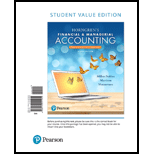
Concept explainers
(1)
Adjusting entries are those entries which are made at the end of the accounting period, to record the revenues in the period of which they have been earned and to record the expenses in the period of which have been incurred, as well as to update all the balances of assets and liabilities accounts on the
Accounting rules for
- To record increase balance of account: Debit assets, expenses, losses and credit liabilities, capital, revenue and gains.
- To record decrease balance of account: Credit assets, expenses, losses and debit liabilities, capital, revenue and gains.
Deferred expenses:
Advance payment for future expenses is called as prepaid expenses. These prepaid expenses are considered as assets until they are expensed or used. For the portion of used assets, expenses would be recognized by way of passing an adjusting entry. Prepaid expenses are also known as deferred expenses, because at the time of making payment, expenses are not recognized but deferred until they are used up.
Deferred revenues:
Collection of cash in advance to render service, or to deliver goods in future is known as unearned revenues. These unearned revenues are considered as liabilities until they are earned. For the portion of rendered services or delivered goods, revenues would be recognized by way of passing an adjusting entry. Unearned revenue is also known as deferred revenues, because at the receiving of payment in advance, revenues are not recognized but deferred until they are earned.
Accrued expenses:
Accrued expenses are the expenses that have been incurred but have not been paid yet. These accrued expenses create accrued liabilities. For the portion of payment made, accrued liabilities would be reduced by way of passing an adjusting entry.
Accrued revenues:
Accrued revenues are the revenues that have been earned, but the cash has not yet been collected for the earned revenue. These accrued revenues create assets. For the portion of collection of cash, created assets would be reduced by way of passing an adjusting entry.
To journalize: The transactions, assuming that R Way debits an asset account for prepaid expense and credits a liability account for unearned revenues.
(2)
To prepare: The related adjusting entries at December 31, 2018.
(3)
To post: The journal and adjusting entries to T-accounts (except cash account), and show their balances at December 31, 2018.
4
To repeat: The above three requirements, by debiting an expense account for prepaid expense and crediting a revenue account for unearned revenues.
5
To compare: The account balances in requirement 3 and 4.
Want to see the full answer?
Check out a sample textbook solution
Chapter 3 Solutions
Horngren's Financial & Managerial Accounting, The Financial Chapters, Student Value Edition (6th Edition)
- Financial Accountingarrow_forwardKhayyam Company, which sells tents, has provided the following information: Sales price per unit Variable cost per unit $40 19 $12,800 Fixed costs per month What are the required sales in units for Khayyam to break even? (Round your answer up to the nearest whole unit.) OA. 217 units B. 674 units OC. 610 units D. 320 unitsarrow_forwardPlease need help with this accounting question answer do fastarrow_forward
- Jingle Ltd. and Bell Ltd. belong to the same industry. A snapshot ofsome of their financial information is given below: Jingle Ltd. Bell Ltd. Current Ratio 3.2 : 1 2 : 1 Acid - Test Ratio 1.7 : 1 1.1 : 1 Debt-Equity Ratio 30% 40% Times Interest earned 6 5 You are a loans officer and both companies have asked for an equal2-year loan. i) If you could facilitate only one loan, which company wouldyou refuse? Explain your reasoning brieflyii) If both companies could be facilitated, would you be willingto do so? Explain your argument briefly.arrow_forwardDetermine the total fixed costs of these accounting questionarrow_forwardPerreth Drycleaners has capacity to clean up to 5,000 garments per month. Requirements 1. Complete the schedule below for the three volumes shown. 2. Why does the average cost per garment change? 3. Suppose the owner, Dale Perreth, erroneously uses the average cost per unit at full capacity to predict total costs at a volume of 2,000 garments. Would he overestimate or underestimate his total costs? By how much? Requirement 1. Complete the following schedule for the three volumes shown. (Round all unit costs to the nearest cent and all total costs to the nearest whole dollar.) Total variable costs Total fixed costs Total operating costs Variable cost per garment Fixed cost per garment 2,000 Garments 3,500 Garments 5,000 Garments $ 2,800 2.00 Average cost per garment Requirement 2. Why does the average cost per garment change? The average cost per garment changes as volume changes, due to the component of the dry cleaner's costs. The cost per unit decreases as volume , while the variable…arrow_forward

 AccountingAccountingISBN:9781337272094Author:WARREN, Carl S., Reeve, James M., Duchac, Jonathan E.Publisher:Cengage Learning,
AccountingAccountingISBN:9781337272094Author:WARREN, Carl S., Reeve, James M., Duchac, Jonathan E.Publisher:Cengage Learning, Accounting Information SystemsAccountingISBN:9781337619202Author:Hall, James A.Publisher:Cengage Learning,
Accounting Information SystemsAccountingISBN:9781337619202Author:Hall, James A.Publisher:Cengage Learning, Horngren's Cost Accounting: A Managerial Emphasis...AccountingISBN:9780134475585Author:Srikant M. Datar, Madhav V. RajanPublisher:PEARSON
Horngren's Cost Accounting: A Managerial Emphasis...AccountingISBN:9780134475585Author:Srikant M. Datar, Madhav V. RajanPublisher:PEARSON Intermediate AccountingAccountingISBN:9781259722660Author:J. David Spiceland, Mark W. Nelson, Wayne M ThomasPublisher:McGraw-Hill Education
Intermediate AccountingAccountingISBN:9781259722660Author:J. David Spiceland, Mark W. Nelson, Wayne M ThomasPublisher:McGraw-Hill Education Financial and Managerial AccountingAccountingISBN:9781259726705Author:John J Wild, Ken W. Shaw, Barbara Chiappetta Fundamental Accounting PrinciplesPublisher:McGraw-Hill Education
Financial and Managerial AccountingAccountingISBN:9781259726705Author:John J Wild, Ken W. Shaw, Barbara Chiappetta Fundamental Accounting PrinciplesPublisher:McGraw-Hill Education





